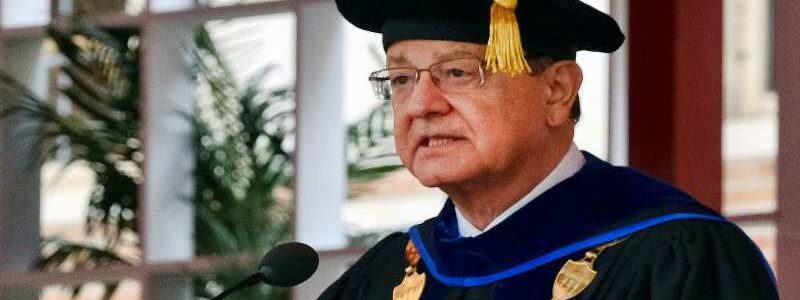
Former USC president, ousted after sex abuse scandal, still earning millions a year later
A year after the University of Southern California’s president stepped down in the wake of a campus sex abuse scandal, C.L. Max Nikias still received almost three times his base pay.
Nikias resigned in 2018 after sexual assault allegations surfaced against a longtime campus gynecologist, who was later charged with 35 counts of sexual assault and battery against female students. That year, Nikias earned $7.7 million — a payout that made him the highest-paid university president in the country, according to the Chronicle of Higher Education.
The following year, according to the university’s just-released tax filings, Nikias received another $5.2 million in compensation — more than any other university employee. His base pay was $1.4 million. He also received $1.5 million in “bonus and incentive” pay, plus another $1.9 million in “other reportable compensation,” including lodging costs for his use of the university’s presidential home through April 2019. The remaining compensation was largely from a retirement plan and other deferred compensation.
In contrast, the university reported that its current president, Carol Folt, earned just $1.3 million.
The tax filing also showed Nikias had a $3 million housing loan from the university, of which he still owed $2.5 million. Nikias bought a Manhattan Beach home from sports media personality Colin Cowherd for $4.1 million in the fall of 2018, according to the Los Angeles Times.
USC officials declined to speak with USA TODAY. A statement from the USC board of trustees said the group voted to honor Nikias’ contract and agreed “to certain other provisions to accelerate his departure prior to the end of his three-year term,” which was up in 2019.
The settlement: USC agrees to $852M settlement with more than 700 women who alleged sexual abuse by former campus gynecologist
“The compensation reflects money owed to him for salary, retirement and other benefits, some of which date back to the employment agreement he entered into when he became President in 2010,” the statement said. Nikias was reappointed in 2016 but stepped down in 2018 prior to the completion of his term.
Nikias, who is still a faculty member at the university, was not directly involved in the accusations against gynecologist George Tyndall. Allegations surfaced in 2018 against the former gynecologist, who surrendered his license in 2019 and is awaiting trial on the criminal charges.
Shortly after the allegations became public, students called for Nikias’ resignation, saying that USC failed to respond to complaints of misconduct involving Tyndall. A few days later, Nikias resigned.
In 2020, the U.S. Department of Education announced it had completed an investigation into the university, finding that USC failed to protect students from Tyndall.
The department also required the university to overhaul its processes for following Title IX — the federal law that prohibits sexual discrimination in education — plus conduct a formal review of current and former employees and allow government oversight for three years.
In March, USC agreed to an $852 million settlement with more than 700 women who have accused Tyndall of sexual abuse.
‘Extraordinarily egregious’: USC slammed for not stopping predatory doctor George Tyndall
At the time of his resignation, Nikias had come under fire for a string of scandals, including one involving then-medical school dean Carmen Puliafito.
Puliafito, who was filmed apparently smoking methamphetamine, resigned as dean in 2016. He remained as a professor until the university fired him in 2017 after a Los Angeles Times story documented his illicit behavior, including drug-fueled parties in hotel rooms.
The university was also implicated in the national college admissions scandal known as Varsity Blues, in which wealthy parents were accused of paying bribes or faking academic and athletic credentials to help secure their children spots at highly selective colleges. Several of USC’s coaches have since pleaded guilty to their involvement in the scandal, which ran from 2011 to 2018.
Contributing: Steve Berkowitz and Erin Richards, USA TODAY
Source: Read Full Article